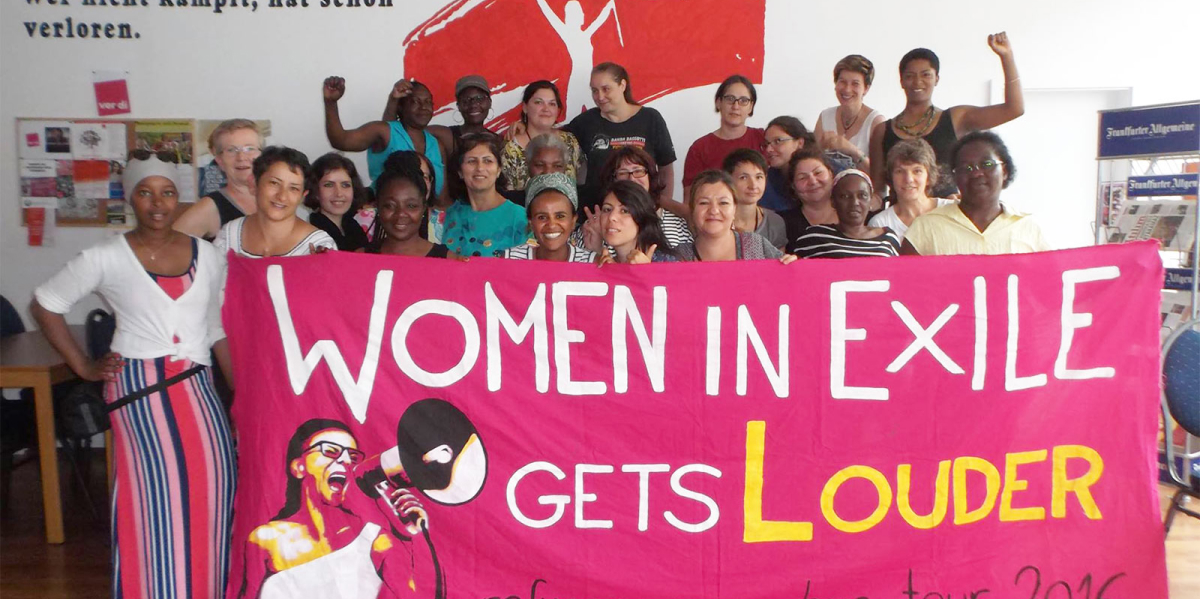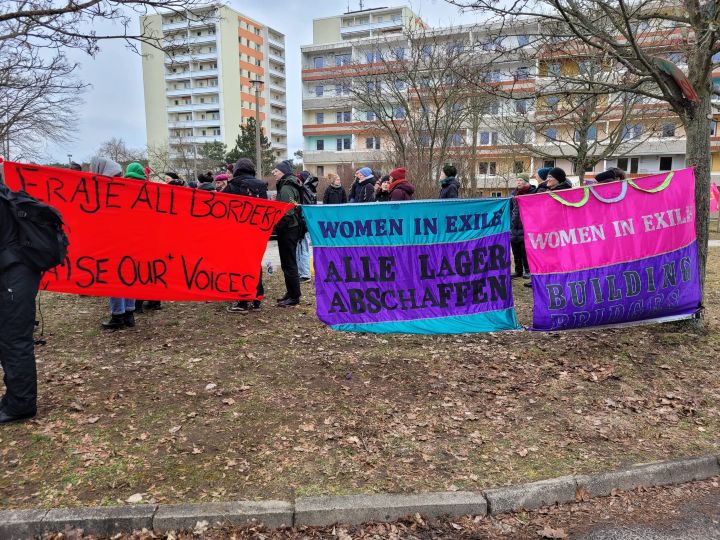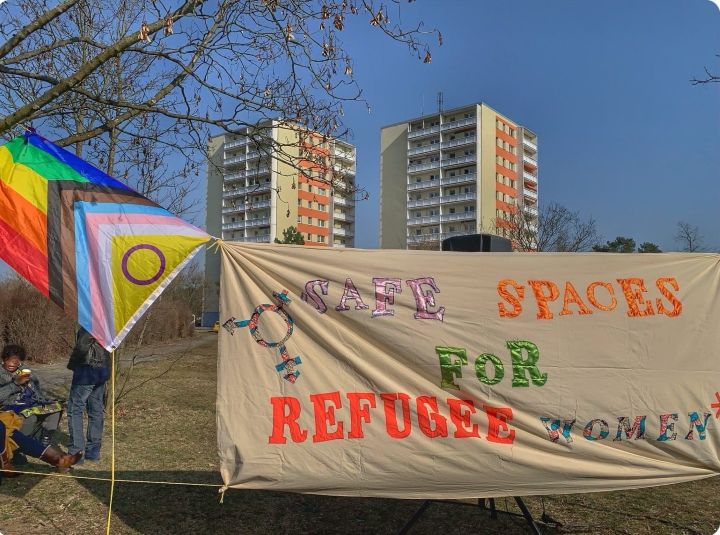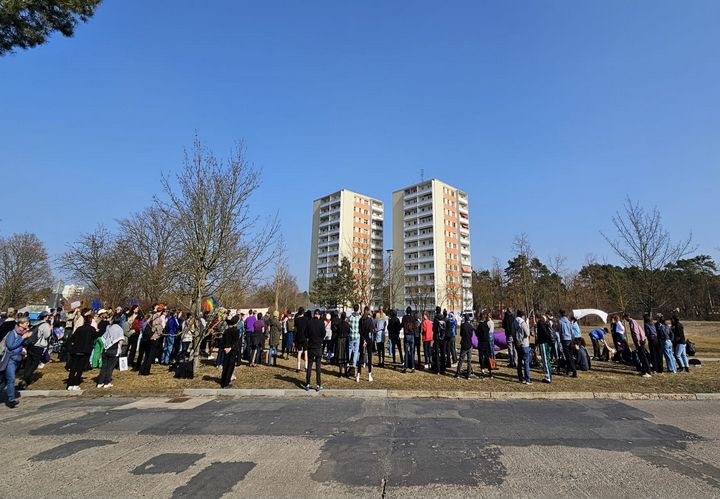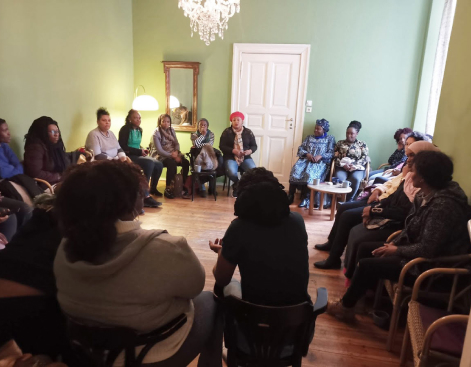Excerpt from pages 150–162 of our book “Breaking Borders to Build Bridges“ available through Edition Assemblage
This text is composed of voices from a few of the Friends of Women in Exile who were active in the past or at the time of writing. These were in response to a questionnaire and compiled afterwards.
Women in Exile & Friends consists of both „Friends“ and „Supporters“. What are their tasks and activities?
Chrissy: Supporters are there more irregularly for support. Some Supporters are there for one action and others who support again and again for years at different meetings or actions. The tasks range from cooking, childcare, graphic design for flyers, translating at meetings and events to helping with shifts at the information stand and setting up for actions and events. For example, I first joined as a Supporter. I got to know the group through a workshop and then went to the „Women Breaking Borders“ conference. They were looking for Supporters for the cooking and I signed up for it. As I was quite impressed and found the work very important, I joined the 2018 bus tour as a driver for a week. After that, I sometimes assisted with cooking and childcare and after a few months I was asked if I would like to be active in the Poli group. Being in the Poli group means being a friend and organising together as Women in Exile & Friends. It is always important not to be too dominant as a friend, because the experiences and needs of the refugee women are at the centre and they know best and are the experts on their own situations.
Annette: Friends – roughly I would say those who regularly participate in joint meetings of the active women of Women in Exile & Friends and take part in discussions, contribute their own content and offer their supportive skills. They belong more to the group of Friends. With them, Women in Exile also organises joint weekends for reflection, discussion on solidarity cooperation, on different topics and planning new actions.
Antonia: Friends have multiple roles. Women in Exile & Friends form a network, some see it as a family (…). Informal links are also formed within this network. Being a Friend of Women in Exile can be very different. I took part in meetings and contributed my ideas. At times I was a regular at the project house in Potsdam. Office duties, support in organising events and public relations were among my tasks. (…) In a time when I took a step back, I cooked for the group only sporadically and saw myself more as a Supporter. Being a Friend needs more commitment.
Chrissy: A typical task for Friends is, for example, to register demos and actions with the police. Since we don’t have to worry about this because of our residence status, we can use our privileges in this way. Especially those Friends who are native speakers of German and socialised in the German system find it (usually) much easier to take on these tasks or to communicate with the authorities.
How and when did it start that Friends joined the political orga group of Women in Exile?
Peer: When I moved to Berlin in 2003, I met Women in Exile again and again at various demos, meetings and rallies. Since such anti-racist actions were still quite small and stood out 20 years ago, we soon got to know each other personally and started talking. I had met other self-organised refugee groups in different contexts before—such as FiB (Flüchtlinginitiative Berlin Brandenburg), which were mostly very cis-male dominated—but not a self-organised group of refugee women*. I learned that Women in Exile was lacking in financial and other resources at that time. And so, as a white person who had previously been organised mainly in white-dominated, queer, and anti-racist contexts, I tried to support the group by organising solidarity parties, applying for funding, registering demos, finding suitable and free spaces, and so on. For the regular meetings of the refugee women*, friends and I took over childcare and sometimes also cooking or translating. It was clear to me that I, as a white non-refugee person, would not be involved in the content. I had experienced many „anti-racist“ groups and no-border camps in the past that were dominated by non-refugee whites. I still remember how, after a few years, some refugee activists asked at a meeting what it would be like if the structure of Women in Exile opened up to non-refugees. And so the idea slowly developed to open some meetings also to Friends who had been able to get to know the group and its political struggles as supporting persons for a longer period of time.
What was/is your motivation to be active in Women in Exile & Friends?
Antonia: A friend told me about Women in Exile & Friends in 2011. The initiative had only recently been formed and was still open to other Friends, Ffriends without a history of flight. She mentioned names. I knew one of the initiators of Women in Exile, Florence, from another context. I had admired her moderation at an event I had co-organised on HIV/Aids. The friend told me more. The goal of Women in Exile is: women out of the camps. My first thought was that it is generally inhumane to house people in these camps – including men. But I was very curious about the organisation of women refugees, a structure without male dominance. I came from the white-dominated women’s* and lesbian movement and from anti-racist contexts, the latter often dominated by men. I liked the fact that refugee women* organised themselves autonomously, it attracted me.
Annette: After different approaches to participate in mixed structures ([white Germans, lesbian – so far mainly active in women*/lesbian contexts) (refugees, BIPoC, white – mainly male dominated), I met the women* of Women in Exile & Friends. My heart went out to them! Women* who organise themselves, who plan joint actions with women* in solidarity. I thought that was great and I was thrilled by how open, fun and empowering the women* were with each other. If I already found it important to practice practical solidarity together with „affected people“, I also found a women*’s -context in Women in Exile & Friends. As a lesbian and woman* with experience of sexualised discrimination, I had organised myself autonomously, so I also saw a common ground in this. Here I had the impression of finding a place where I could organise myself again with women*. Women* who are self-organised, who formulate what they need, what solidarity can look like without being dominated. They gave me the space to bring in my competence and to learn practical solidarity in a self-organised group of women*. I wanted to take up this challenge. I also liked the fact that the organisation was very close to the needs and possibilities of the women. So everyone paid attention to translation, childcare was organised, topics were worked out according to the needs of the women.
How do you see your role as a Friend or Supporter? What does Friend mean to you?
Petra: I was active as a Friend of Women in Exile for several years, starting around 2010. After a big meeting in Jena, meetings for Women in Exile & Friends started in Berlin. For me as a friend, these were beautiful, exciting, refreshing and challenging. I have fond memories of this time. There was little money or other official resources, but a lot of drive, friendliness and improvisational talent. Working with women* who have such great differences in access to privilege and have had such different experiences in their lives was also difficult. This gradually became apparent to me in our sometimes contradictory assessments of goals, importance, expressions and vulnerabilities. An example of this is what the term Friend means in this context. For some it meant a Supporter, for others a political comrade with her own and divergent political goals, for some both, and much more. In my mind, this discussion is still not over and currently I think that this question will remain as long as there are such different and unjust distributions of privileges. It was painful for me to realise that in a racist world, as a white woman*, I was also contributing to racist structures again and again, even without wanting to.
Antonia: In my role as a Friend, I have always supported refugee women* on a personal level. I helped them find a lawyer or a flat, went with individuals to the immigration office or wrote letters. I call this task support. I have become even more aware of how unique each person is, how diverse all of our stories and life plans are. For me in my role as a Ssupporter, this means that we have to look very closely to understand what each woman needs. Assumptions of commonalities and differences must always be questioned. I am constantly confronted with my own prejudices and racism. Occasionally I find myself trying to define what refugee women are like. I look for group characteristics that do not exist. Sometimes I also assume commonalities that don’t exist.
Peer: For me as a trans* person, the English gender-neutral word „Friends“ fits perfectly. I see how the term „Friends“ and also the role can be filled in terms of content as an ongoing and changing process. Over the years we have tried out different things, discarded them and found new ones. We have tried to reflect and change criticism of our dominant behaviour and the stress we caused. I think it is important to mention that many – but not all – of the Friends were/are white. Being a Friend for me personally means being „allied“. This can mean private friendships within the group. But also in the political sense: from different perspectives and with different privileges, to fight together for similar goals, to reflect, to argue and to continue to organise together despite some differences.
How do you experience organising together with Women in Exile & Friends (as a Friend) and what challenges did you face?
Annette: Basically, there are many difficulties and conflicts in every long-term organisation. This is also the case with Women in Exile & Friends. They are also based on the fact that we are busy and confronted with very many issues at the same time. The very different women, with different experiences of flight, different backgrounds, the situation and conditions of being here, the different languages, experiences of racism, sexualised violence and much more. The supporters without refugee experience (both white and BIPoC), are also different in their political orientation, privileges, the challenges of dealing with racism, experiences of sexualised violence, language, etc. What is the real situation? What does each individual have to deal with on a daily basis? What motivation does everyone have to organise? How do we approach things? What does everyone bring to the table? How respectfully do we treat each other? How do we address difficult issues? How do we criticise? AND above all, what do we draw strength from, what inspires us? What does everyone need? How do we manage to include all these differences in the common organisation? To be able to keep all these issues apart, to reassemble them, to find some kind of structure or space so that all this has its right to be seen – that is a huge challenge! The different composition and expectations also bring conflicts that we often could not manage. Often the need to act outwardly (events, demonstrations, resistance actions) prevailed and a „minimal consensus“ was enough to do so. There was often a lack of clarity about whether we wanted to go into depth, into reflection and take our time. Sometimes a mutual mistrust remained, some questions remained unanswered, and sometimes women stayed away without us asking them to find out what their reason was. Sometimes conflicts were not talked about openly either, for better or worse.
Peer: I have been organising in political groups for over 30 years. Unfortunately, I have often seen them break down because of conflicts over different personal and political views. What I find very special about Women in Exile & Friends is that despite various challenges, the group continues to exist. Of course, I don’t always agree with the way we deal with conflicts and I think it is important to reflect a lot more together, especially when members leave the group because of a conflict. I think it’s often a balancing act not to get completely stuck in arguments and lose sight of the political activities and goals. However, neither is it the other way round to hold activism so high and refuse to reflect promptly on, for example, LGBTIQ-discriminating statements. I am organised as a white queer trans* person in Women in Exile & Friends because, despite everything, I have found more commonalities than divisions in the past 20 years: activism in Women in Exile & Friends is not limited to attending a group once a week and organising a demo twice a year. The resistance is everyday, is political AND personal. It starts with the organisation of supportive housing for women* threatened with deportation, continues with the mobilisation of refugee women* in Brandenburg camps and doesn’t stop when Nazis destroy our bus in Cottbus after an 8th of March demonstration. The group welcomes people of all ages and backgrounds, and the toddlers from back then are now standing with others at the summer camp organised by Women in Exile at Oranienplatz, providing food for 300 people. I still see it as a great challenge to create an intersectional perspective, i.e. to think about different forms of discrimination, to respect our differences and to find common ground in them. In 2021, for example, there were two awareness-raising workshops on LGBTIQ, more are to follow and I would like to see that in the future there will continue to be enough time to learn a discrimination-critical attitude in relation to various forms of privilege.
How are these power imbalances and different privileges of the Friends and the refugee women, who are often in precarious life situations, dealt with in the group?
Chrissy: Apart from the fact that we as Friends reflect for ourselves personally, „rules“ or guidelines for the joint organisation were also derived from problematic experiences. For example, no more Friends than refugee women should be present at meetings. Friends should not take up too much space at the meetings, e.g. they should pay attention to how many speaking shares they have at a meeting. We also try to meet with all Friends every few months to reflect, exchange and share our experiences when new Friends join. The women with refugee histories also have meetings without Friends to have space to reflect on the joint organising.
Have the role and tasks of the Friends changed over the years and how?
Peer: I think so. In the beginning, the Friends had a lot of knowledge about resources and access to certain political structures. The group of refugee women* at the biweekly Poli meetings (Poli means politics) could often be counted on one hand and the Friends were sometimes outnumbering them. In the organisation of the first larger summer actions lasting several days/weeks, we Friends had a very large share of responsibility and, in my opinion, were also too present in public. In the meantime, there are 30 activists in the Poli group, only a small part of whom are Friends, and the majority of the people working in the Women in Exile office are refugee activists. Women in Exile is now a better known group than it was ten or 20 years ago. There are more resources, such as a dedicated meeting space, the children’s collective Kiko for childcare, donations, places like the Oyoun or Aquarium that provide spaces for larger meetings. This may have made organising political resistance, independent of Friends‘ knowledge of access points, a little easier. And we can focus more on working together on content.
Do you think that your time in the group influenced your later political activities and who you are as a person? In what way?
Peer: I was particularly influenced by the raft tour in 2014, when Women in Exile & Friends was invited by Heinz Ratz and his band „Strom und Wasser“ to travel across Germany for seven weeks and to set up an information table at his concerts in the evenings. Since Women in Exile & Friends had hardly any financial resources and was also hardly known nationwide, we improvised from day to day. If the band (mainly white men) got a great catering and good sleeping places, we (a group of refugee women*, their children and a few Friends) hoped for donations to pay for the next dinner and the rented minibus. When we were tired after a long day on the raft and subsequent visits to camps to mobilise refugee women*, we went to the concert stage in the evening to ask the audience for sleeping places for our group. I learned to remain more relaxed and confident during this and other larger and smaller actions, which I would hardly have thought possible from my previous political socialisation. And to trust that we will achieve a good goal in the end. I will also never forget how unrelaxed some of us Friends were when in the summer of 2018, on a bus tour, it was spontaneously decided to dare an illegal border crossing into Switzerland to the climate camp. One refugee activist said to us, „Do you think we had the press and a lawyer with us at the time when we fled to your country?“
What advice would you give to other activists without a refugee background who want to organise with activists with a refugee history?
Annette: It is important to always question: Am I open? Do I see myself from the perspective of a support person without refugee experience? Do I reflect on my privileges, do I reflect on my own behaviour? Can I perceive and communicate my own boundaries? Do I myself have an open mind, see differences as a challenge by which we can learn from each other? For example, knowing that everyone has competencies and life experiences that can be very different from mine. To engage with them without judging, but listening and appreciating.
Peer: If you want to organise an event or a meeting, make sure that the framework conditions are right: Childcare, food, travel costs, is there public transport on that day/time, sleeping places, etc.?
Annette: Make sure there are good translations, plan space and time for this. At larger meetings, form small groups in between with the same focus and/or similar composition, so that women can talk in what they consider a „safe space“, different opinions on a topic can arise and women in small groups are more likely to have their say.
